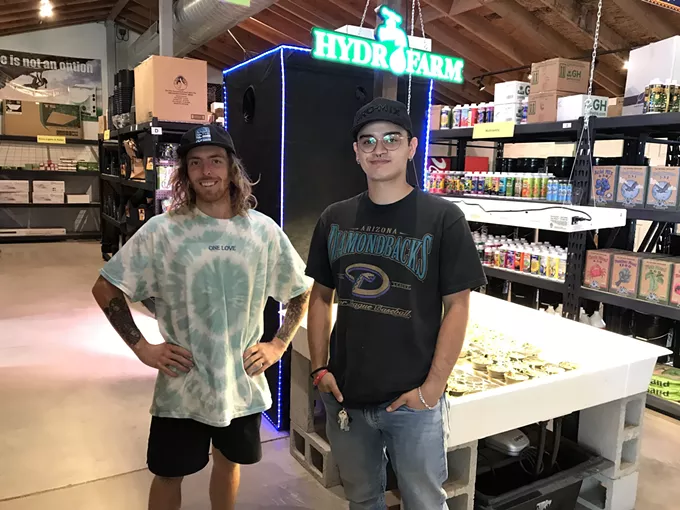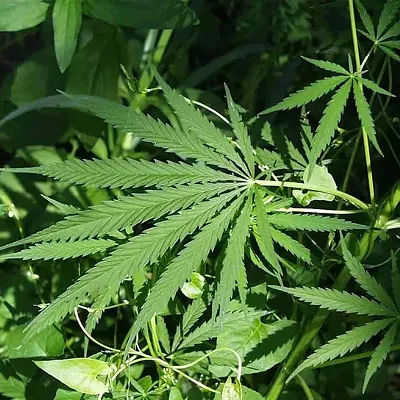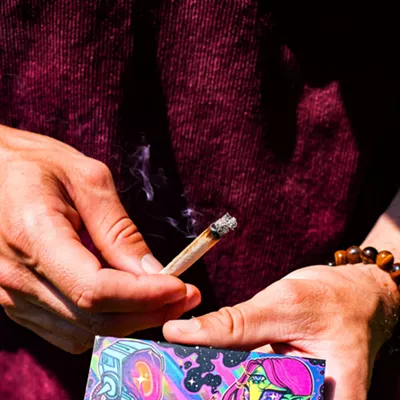
Growing your own pot can be a rewarding experience, particularly when you consider how much it costs to buy your weed at the local dispensary.
But getting started can be difficult, so what better place to learn about the ins and outs of the craft than an established hydroponics shop with a full-blown nursery attached?
Green Lady Hydroponics is a locally owned business established in 2017 at the iconic Green Things Nursery, which has been in operation since 1970 serving generations of Tucson gardeners and plant aficionados.
With the legalization of adult-use marijuana and spurred along by the COVID pandemic, Green Things is carving out a niche in the home-growers landscape, with classes and discussion groups creating a community of pot growers who learn from Green Things' cannabis experts and from each other.
"There's been an unbelievable response and increased demand in the last year and everything kicked in," says Green Things employee and master grower Tower Crist. "People want to try to grow at home with hydro."
Crist, along with fellow employee Francisco Carmona, have been growing their own for a few years and are both on-hand to share their knowledge and teach the basics of marijuana growing or help experienced growers overcome problems that might arise.
"We have a group of people and are creating a community of growers," Carmona says. "We've developed community relationships and have learned from sharing our mistakes."
Carmona adds that there can be a steep learning curve, but once the novice grower gets past that, they have not only acquired a great hobby, but they can also save money in the long-term over what they might spend on recreational or medicinal weed.
"Even a medical patient is spending a lot at a dispensary," he said. "If you smoke one gram a day, you can save thousands of dollars a year if you grow your own."
Carmona and Crist both worked their way up through the company, starting off as cashiers and eventually taking what they learned to the next level. They are master growers who started out with garden vegetables and have applied that knowledge to the craft of cannabis cultivation.
Green Lady not only offers hydroponic equipment, but also everything needed for traditional growing as well.
For the beginner, Carmona and Crist can help set up a growing kit and "point them in the right direction." From lights to tents to growing media, the pair can help determine what is best for any given situation.
"To get started you probably need a 4'x4' tent space for up to three plants," Crist says. "Depending on your style of growing, you can get started for a few hundred dollars."
Crist says one of the main costs for indoor grows can be lights. Larger light kits can run from $400 to more than $1,000 for a good LED system. A good rule of thumb, though, is that you can get 2 to 2.5 grams per watt.
"There's a steep learning curve and hydro is a lot less forgiving but it can be faster," Carmona says. "Nothing will ever beat the full spectrum of light from the sun, but with a tent you can grow year-round and you don't have to worry so much about theft or complaints from the neighbors, since it's not visible from the outside."
He says that since cannabis is a flowering annual, "if you can grow a tomato plant, you can grow weed."
Since the shop is so busy during the pandemic, classes and groups have been taking place "every other month or so," but they hope to have a more regular schedule coming soon. They also hope to someday sell seeds and starters if doing so is ever legalized in the state of Arizona.
"It can get complicated," Crist says. "But to get started, all you need is hydroponics or a bucket of dirt: There are a lot of different ways to do it."
Carmona says that with their local growing experience, they can also help fine-tune grows for the local climate.
"We're desert grow specialists and can talk about growing in the heat," he says.
In operation since 1970, Green Things Nursery opened Green Lady Hydroponics in 2017 as an extension of the indoor gardening portion of the business, according to owner Jan Westenborg.
The locally owned and operated shop has experienced geometric growth over the past few years and the team expects the trajectory to continue as they become Tucson's one-stop shop for hydroponics, emphasizing maximum efficiency to set up new gardens and/or fine tune customers' current systems.
Classes, workshops and group discussion announcements can be found at Facebook.com/greenladyhydroaz or on Instagram.
For more information, call (520) 209-1881 or drop in to the west side of Green Things, located at 3235 E. Allen Road, in Tucson, near where River Road turns into Alvernon Way.
CANNABIS KINGPIN STEVE WHITE SELLS HARVEST. The biggest news in Arizona cannabis this week was Monday's announcement of the sale of Harvest Health & Recreation—by far the largest marijuana company in Arizona—to Florida's Trulieve in a deal said to be worth $2.1 billion.
Should the deal go through, the resulting conglomeration would be the biggest cannabis company in the U.S. with about 126 dispensaries and operations in 11 states, according to the announcement that came out early on the morning of May 10.
Currently, Harvest has 39 operating shops in five states and was the first operator to sell adult-use marijuana when the Arizona Department of Health Services surprised everyone on Jan. 22 by suddenly announcing the opening of legal sales in the state.
"We are thrilled to be joining Trulieve, a company that has achieved unrivaled success and scale in its home state of Florida," White said in a prepared statement. "As one of the oldest multi-state operators, we believe our track record of identifying and developing attractive market opportunities combined with our recent successful launch of adult use sales in Arizona will add tremendous value to the combined organization as it continues to expand and grow in the coming years."
The new deal with Trulieve includes a $100 million "reciprocal termination fee" should it fall through. Both companies' boards of directors have approved the deal, but shareholders must now approve it and the deal must also survive regulatory scrutiny.
HIGH AND HORNY. I'll bet our good readers did not know there was such a thing as weed porn, but a recent Cannabis Insider news brief informs us that Canadian cannabis entrepreneur and former Liberal Party official Chuck Rifici is in talks to acquire Pornhub, despite the Canadian government going after the site "after recent [unspecified] controversies."
As it turns out, there are porn sites completely devoted to "weed porn," and most of your run-of-the-mill porn aggregation sites have weed sections as well.
Research on this one was hard, but as I Googled "Pornhub+cannabis" I came across these gems attributed to Rolling Stone:
"The adult entertainment and cannabis industries pair well for a number of reasons. 'I think porn and weed are sister industries,' says Kristel Penn, a spokesperson for Emerald Triangle Girls, the only porn company devoted entirely to 420-focused content. 'Each carries its own stigma, misinformation from the outside, and taboo, although both are multi-billion-dollar industries.'"
And this:
"Performers' stage names—like Jenna Sativa, Misty Stone, Allie Haze, and Karla Kush—can speak volumes about their smoking habits, as do their weed-infused social media presence."
You're welcome.
FROM CAPITALISM TO SOCIAL EQUITY. Last week, the Arizona Department of Health Services dropped the draft rules for the social equity program intended to help communities that have been hardest hit by the War on Drugs.
The rules can be found at www.azdhs.gov and citizens have until May 16 to take a survey and provide feedback.
Advocates—as well as the Tucson City Council—have been waiting for the rules to drop to see if the state can create an equitable program that will do more than provide cover for Big Cannabis to acquire 26 additional licenses that will be released once the rules are in place.
The City of Tucson is holding off completion of updates to its Unified Development Code Related to Medical and Adult Use Marijuana Dispensaries until it is determined the rules are truly egalitarian and fair to impacted communities.
"In Tucson, for the most part, the market consists of small, locally owned business owners, but we also have industry heavyweights that are eyeing Tucson and the state of Arizona with this adult-use issue," Romero said during an April 6 council meeting where the changes were discussed. "Right now the system is very favorable to industry giants through exorbitant application fees, and many minority communities simply lack the access to capital that the current system demands."
Southern Arizona NORML, which has closely tracked the myriad aspects of the legalization process, is skeptical that the rules as they are laid out will achieve the stated goals of the program.
"Prop 207 clearly states that the social equity program is to promote the ownership and operation of marijuana establishments and marijuana testing facilities by individuals from communities disproportionately impacted by the enforcement of previous marijuana laws," SOAZNORML president Mike Robinette stated in an email. "Sadly, the draft rules neglect to appropriately define communities disproportionately impacted by the enforcement of previous marijuana laws... The draft rules fail in defining who can participate in the social equity program and fall far short of adhering to voter intent regarding Prop 207."






